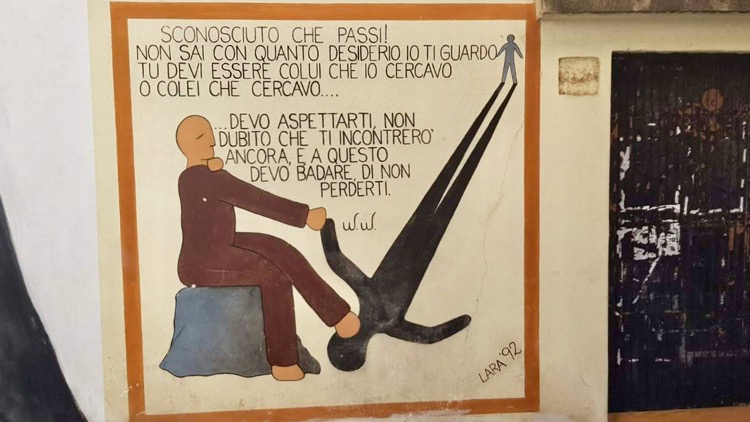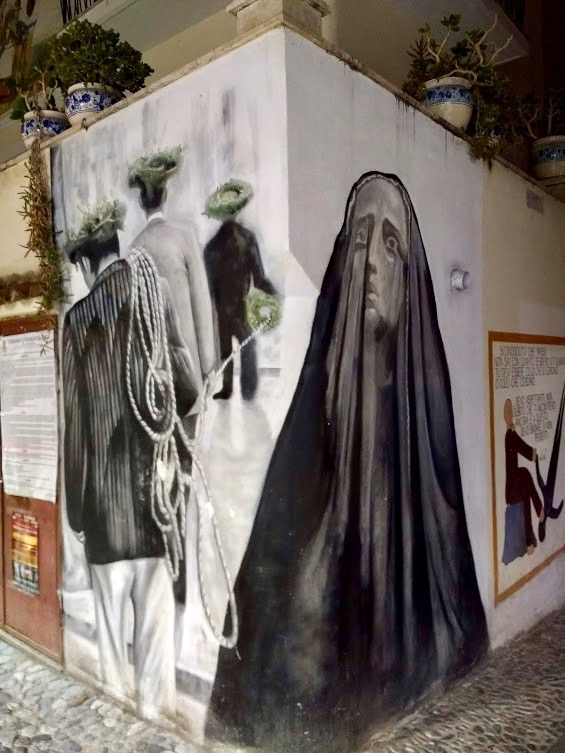These past months have been difficult for everyone and particularly challenging for Italy. First small towns, then larger areas, museums, organized events and the whole country shut down. It got me to thinking about how resilient Italy, its villages and its cities have been, how Italians have come back time and time again after catastrophes of varying natures and proportions. In the spirit of new beginnings, I would like to talk about a revitalization project in a town of northwestern Calabria, today often referred to as the Città dei Murales. On this post, you can visit the compelling murals of Diamante virtually, and hopefully soon in person with the requisite social distancing.
OPERAZIONE MURALES
Back in 1981, Nani Razetti, a Milanese painter enamored with Diamante, proposed a project called “Operation Murals” to the mayor of the coastal town. He jumped on board, and in the first year, 83 Italian and foreign painters joined forces to breathe new life into Diamante’s historic center. The original works still adorn town walls, many of which have been restored as sun and saltwater can take their toll. The project continues today, boasting over 150 murals and extending to other Diamante districts.
The community would eventually become to be known as the City of Murals. Its high-quality spicy pepper accounts for its other nickname, City of the Peperoncino. And interestingly, Diamante is located in the center of what’s called the Citron Riviera, and this special variety of citrus fruit is named the Diamante citron.
MURALS OF DIAMANTE: PLACES, PEOPLE AND TRADITIONS
The range of subjects and styles is wide amongst the murals of Diamante, and by nature of the narrow streets, the images can be difficult to capture photographically.
People are pictured traditionally, such as these two men, one represented with the area’s citron (note the book in his hand entitled Il Cedro or The Citron) and the other dressed as a fisherman.
The mural project also embraces mosaics. In these images, fishermen go about their daily chores and farmers cultivate the citron.
The long mural on this wall shows the challenges of harvesting the low-hanging citron.
Other depictions are more contemporary, such as the women in the photos flanking the historical representation of filling the water jug.
There is traditional Italian culture and foreign culture.
MURALS OF DIAMANTE: POETIC MUSINGS
In addition to imagery, the visitor will note many words, phrases and longer compositions amidst the murals of Diamante, such as in this excerpt from Walt Whitman’s poem “To a Stranger”:
Passing stranger! You do not know how longingly I look upon you,
You must be he I was seeking, or she I was seeking….
I am to wait, I do not doubt I am to meet you again,
I am to see to it that I do not lose you.
An image of a man standing on a pile of intellectual books in order to reach the top of a brick wall and a dove in flight is accompanied by an aphorism by the Roman poet Juvenal: “The censor forgives the crows and harasses the doves.” The painting to the right features an aphorism by the French poet and philosopher Paul Valéry: “War is a massacre of people who don’t know each other for the profit of people who know each other but don’t massacre each other.”
American Richard Bach, best known for his Jonathan Livingston Seagull, is referenced in another mural with a quote from his book There’s No Such Place As Far Away: “Rise in flight past the night and beyond sunrise…. Fly free and happy beyond birthdays and across forever…. there’s no such place as far away….”
A mural next to a clothing shop ponders the history and fate of this crossroads on the Tyrrhenian Sea: “The Mediterranean, cut through by myths, by hopes and dreams, by heroes and migrants. A legend? A reality! Eyes that look on from afar, helplessly incredulous in a disquieting silence that threatens from below.”
MURALS OF DIAMANTE: DIVERSITY
Strolling through the old town past the intriguing murals of Diamante is de rigueur for both the local population, counting over 5,000, and the town’s visitors, particularly the many summer beachgoers and those attending its various festivals. The images are amazingly diverse. Here are a few more.
Religious references are crowned by the Passion played out on a corner.
Several surreal works pop with bright colors.
A street scene blends with its surroundings.
A young black child implores, larger than life, from a wall.
Fishermen repair their nets in a mural enhanced by a real window and live house plant.
A Disneyesque lion makes a splash on an already bright yellow wall.
Is your head full?
Interested in other contemporary art and artists in Calabria? On this blog, read about Nik Spatari in MuSaBa: Not Just a Museum, Textile Artist Domenico Caruso, A Dream in Terracotta, ARGHILLÀ l’arte delle terre of Nicola Tripodi, Enzo Ferraro and the Ceramics of Seminara, Salvatore Tonnara in An Artist in Amantea and The Palazzo della Cultura in Reggio Calabria. And for an in-depth look at the beautiful land in the toe of the boot, check out Calabria: The Other Italy, my non-fiction book about daily life, history, culture, art, food and society in this fascinating southern Italian region. It’s available in paperback and e-book versions.
Check out the itineraries of my Calabria tours, “like” Calabria: The Other Italy’s Facebook page and follow me on Karen’s Instagram and Karen’s Twitter for more beautiful pictures and information.
Sign up below to receive the next blog post directly to your email for free.





















Comments 24
I truly enjoyed your email. I have sent your email to a client who was intending to visit Calabri next year….his plans have been put off for now. Italy will recover … of this I am sure.
Ciao e Pace
Author
Thank you. Everyone’s plans have unfortunately changed, but I think more disconcerting is the “wait and see,” the not knowing what the future will bring. But as you say, we all will recover. Cari saluti.
BEAUTIFUL photos & areas shown !! Molto grazie, Karen!!!
Author
Prego, glad you enjoyed the post!
Thank you for a neat description of the murals
Author
Happy you liked my blogpost.
What a delightful blog! Informative, interesting and stimulating –as is most everything you put your hand to.T
Author
Thanks – these rich images inspire thoughtful conversation.
Wow, fantastico!
Author
Grazie, molte delle immagini sono magiche.
Thank you Karen, always such an interesting read, will forward on to some Italian friends, both Sicilian and Calabrian. Take care and keep posting,
Regards Louise N.
Author
Glad you enjoy my blog and thanks for sharing – it’s always appreciated. Best to you.
Grazie Karen! i have read about this town before, but I can’t remember where. Some of these murals are gorgeous, although I could do without the Disney lion. I prefer the images that look like they have a connection to a small southern Italian village. Let’s hope we can get back to travelling soon…well not too soon, but soon! Ciao, Cristina
Author
I had so many images to choose from and as odd as that lion king may seem, the bright colors jumped out at me and I found myself wondering if the homeowners had chosen the string door curtain before or after the big cat. On the one hand, I agree that a connection to the location is preferable, but on the other, I can see that the people might not want to feel frozen in time. It’s certainly a delicate balance, but one thing’s for sure – the mailman won’t have any trouble finding the lion house!
Great post and photos!
Love Diamante and its murales. Always take friends and family visiting from overseas to Diamante and it’s never disappointing. The murales are added to all the time so always discover new ones to photograph.
Author
Thanks! Yes, Diamante is a perfect place to take guests or a date . . .
Ah, how wonderful to have an outdoor museum like this! I’m so grateful to all the artists who decided to gift their talents to these murals. And thank you for sharing this bit of art with us.
Author
Public art can serve so many purposes – spark conversation, entertain, edify and give the community a face lift! Glad you enjoyed it.
Diamante is such a treat. I took my mom there when she came to visit me and she absolutely loved it. It’s so much fun wandering around the little narrow streets and finding murals everywhere you turn. I need to go back because there are so many murals I didn’t see (some of which you have pics of on this post! haha)
Author
And you can take a break with a citron gelato or a peperoncino liqueur – or vice versa!
What a pleasure to happen upon your blog. In May 2018, I took the trip of my dreams and visited the birthplace of my grandparents in Verbicaro. We stayed in Diamante, which served as our home base. I took many photos of the murals and am so pleased to learn their history. One thing I’ve been trying to discover without much success is what the people of Diamante are called. Inhabitans of Rome are Romans, those of Venice are Venetians, and, of course, we have the Milanese! Are they Diamantese, Diamantini, Diamantans? What, what, what? If you know, please tell me!!!
Author
What a beautiful corner of Italy to have your roots! You ask a good question, but first we need to distinguish between Italian and English. Smaller places don’t have designated English names. Famous cities, such as Rome and Venice, have anglicized names for the place as well as the people; however, in Italian the romani live in Roma, the veneziani live in Venezia, and the milanesi live in Milano. These are all plurals. The singular names for the people: romano, romana, veneziano, veneziana, milanese (male and female because it ends in an e). The people of Diamante are the diamantesi, and interestingly, also adamantini, and in the singular, diamantese and adamantino/a. A while back I wrote a blogpost about Calabrian vs. Calabrese called Calabres, calabrese, calabresi. Italian can get complicated!
Thank you so much for getting back to me. Diamantesi–I love it!!!
Regarding Calabres/Calabrese/Calabresi, my family always said that “our people” were said to be hard-headed. Apparently it is a common belief because when we were in Rome we told a cab driver our family came from Calabria, and he said, “testa dura”!! 🙂
Author
Yes, that’s the nickname!